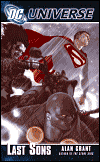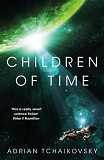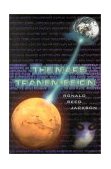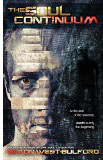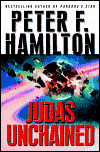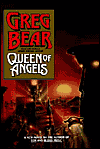
Queen of Angels, by Greg Bear
Book Review by James Michael White
Have you read this book?
Greg Bear's 1990 novel, Queen of Angels, bears distinct similarities to the 1984 Ridley Scott movie, "Bladerunner," in that both plots revolve around deep human questions -- such as, What is it, really, to be human? and how much of who we are we even aware of? -- except "Bladerunner" has the distinction of often being referred to as a flawed classic, possessing even alternate endings, much like Dickens' "Great Expectations," each equally compelling in their own way and yet neither one, alone, quite conveying the artistic completeness of such resolution, whereas Queen of Angels remains a work that, while sporting a sufficient number of interesting ideas and story arcs, doesn't quite achieve the aspirations of any of them.
In Queen of Angels, Greg Bear tackles the issue of human mental stability in a not-so-far future, in which U.S. society is split into two distinct groups, the therapied and the untherapied. Herein lies the dramatic underpinning of the tale, because the therapied individuals, like nominal heroine Mary Choy, get the best jobs and advance to the highest levels of society, whereas everyone else finds themselves increasingly marginalized by society, existing in its lower strata, both physically closer to the earth and of more socioeconomically depressed circumstances.
One of these people, and the most moving among the host of characters, is Richard Fettle, aspiring writer and friend of Emmanuel Goldsmith, the latter a very successful and respected writer who also happens to be both untherapied and quite possibly guilty of a terrible crime. While Richard Fettle struggles to understand why his friend committed his crime, putting his theories to paper in the form of Goldsmith's conscience by proxy, police detective Mary Choy is given the job of tracking him down and bringing him to justice.
Justice is, of course, another of Bear's themes, and competing for equal attention within the novel's framework are two varieties of justice. There's the kind of justice meted out by the modern U.S.A. in which disturbed individuals are therapied, their deep flaws permanently altered in a kind of personality lobotomy (an issue never fully explored, nor quite explained, yet fearfully hinted at by the likes of Fettle and others among the untherapied who hold to their flaws as necessary elements of their personality and, vis-a-vis, their humanity); then there's the old-fashioned kind of retributive justice that values concepts of punishment and guilt, here meted out by religious vigilantes known as selectors.
It is by exploration of the latter kind of justice that Bear introduces a version of voodoo into his science fiction, using it to further counterpoint the contrast between the punishing kind of justice and the rehabilitative kind, at once raising the highest of his literary stakes and, also, creating the most disappointing one.
In order to see some of this exploration in action, Bear gives us Martin Burke, a disgraced genius who developed the technology and processes used to investigate minds and personalities firsthand in ways reminiscent of Spock's "Star Trek" mind-melding crossed with a more "Matrix"-like dip into the virtual-reality-like landscape of another person's mind, complete with all the personal symbols and imagery that compose the personality. It is here, within what Burke refers to as "the Country of the Mind", that the reasons for criminality might be found. It is also here that a mind might be investigated and more thoroughly known by the investigator than it is even to he who possesses it.
The most compelling action of the novel takes place during Burke's investigation, which occurs very late in the game, indeed, and it is also here where some of the story aspirations are found wanting. While investigating the mind of the potentially maleficent Goldsmith, Burke uncovers deeply rooted vodoun symbols within the mind of a man who so deeply wanted to recover his idealized ancestral personality that he may have completely suffused his genuine personality with a construct. Or not. See, the unsatisfying difficulty here is the indeterminate nature of what Burke finds during his investigation into Goldsmith. He either finds a genuine loa, capable of affecting minds like a transmittable pathogen, or he merely finds evidence of a deeply scarred personality whose scars are so profound that they affect those who witness them.
Not taking a firm stand here and developing the story around that stand makes it dramatically less satisfying quite simply because this idea, potentially finding a real vodoun spirit existing in the mind of a criminal, is the biggest and most innovative idea. On the one hand, we might have had an interesting mixture of science fiction and a much more speculative, spiritual kind, wherein the scientific investigation and skepticism turns over an old mental stone and finds beneath it forgotten gods who possess real power.
That this remains merely hinted and not confirmed has the appearance of the story opening a door that Bear didn't want to write through, and brings into question the reason for some of the earlier scenes, as if space that might have gone to developing the more dramatic storyline instead went to less dramatic ones.
Nonetheless, the work rests primarily upon its parallel story arcs in which we see different individuals, including a twinned pair of emergent AIs, struggle with concepts of identity and justice in ongoing point-and-counterpoint fashion. They do this in a world carefully detailed and texturally developed to degrees that, by contrast, leave the deficiencies of an ambitious work all the more visible. At some point it's not merely enough to construct an interesting future in which events arise that allow an author to speculate freely about the nature of justice and personality; the story arcs should lead readers to believe that their time spent in such a world has been productive, that something of weight has transpired, that, at the very least, this world is not the same as it once was and that this change was wrought, and necessarily so, by all that we have encountered. The impression left by the conclusion of Queen of Angels is that things are pretty much the same at the end as they were at the beginning, which undermines the importance of all. Story arcs begun and completed -- emergent AI self-awareness, a search for extraterrestrial life, a search for a criminal who may have fled to the islandic protection of a Kurtz-like character, ala Joseph Conrad's "Heart of Darkness" -- aren't as interesting as the one that didn't quite work, and that one has everything to do with the inner nature of man, including what is in him that is good and evil, and why.
In the end, Queen of Angels is most notable for what it attempts than what it achieves. Neither a complete failure nor an unqualified success, it poses questions of philosophical merit without managing either to personalize them (one exception being Richard Fettle), or to answer them. The result is an intellectual curiosity, but not an emotional one, likely to appeal to diehard SF fans and the philosophically curious, but just as likely to give others a shrug.
In Queen of Angels, Greg Bear tackles the issue of human mental stability in a not-so-far future, in which U.S. society is split into two distinct groups, the therapied and the untherapied. Herein lies the dramatic underpinning of the tale, because the therapied individuals, like nominal heroine Mary Choy, get the best jobs and advance to the highest levels of society, whereas everyone else finds themselves increasingly marginalized by society, existing in its lower strata, both physically closer to the earth and of more socioeconomically depressed circumstances.
One of these people, and the most moving among the host of characters, is Richard Fettle, aspiring writer and friend of Emmanuel Goldsmith, the latter a very successful and respected writer who also happens to be both untherapied and quite possibly guilty of a terrible crime. While Richard Fettle struggles to understand why his friend committed his crime, putting his theories to paper in the form of Goldsmith's conscience by proxy, police detective Mary Choy is given the job of tracking him down and bringing him to justice.
Justice is, of course, another of Bear's themes, and competing for equal attention within the novel's framework are two varieties of justice. There's the kind of justice meted out by the modern U.S.A. in which disturbed individuals are therapied, their deep flaws permanently altered in a kind of personality lobotomy (an issue never fully explored, nor quite explained, yet fearfully hinted at by the likes of Fettle and others among the untherapied who hold to their flaws as necessary elements of their personality and, vis-a-vis, their humanity); then there's the old-fashioned kind of retributive justice that values concepts of punishment and guilt, here meted out by religious vigilantes known as selectors.
It is by exploration of the latter kind of justice that Bear introduces a version of voodoo into his science fiction, using it to further counterpoint the contrast between the punishing kind of justice and the rehabilitative kind, at once raising the highest of his literary stakes and, also, creating the most disappointing one.
In order to see some of this exploration in action, Bear gives us Martin Burke, a disgraced genius who developed the technology and processes used to investigate minds and personalities firsthand in ways reminiscent of Spock's "Star Trek" mind-melding crossed with a more "Matrix"-like dip into the virtual-reality-like landscape of another person's mind, complete with all the personal symbols and imagery that compose the personality. It is here, within what Burke refers to as "the Country of the Mind", that the reasons for criminality might be found. It is also here that a mind might be investigated and more thoroughly known by the investigator than it is even to he who possesses it.
The most compelling action of the novel takes place during Burke's investigation, which occurs very late in the game, indeed, and it is also here where some of the story aspirations are found wanting. While investigating the mind of the potentially maleficent Goldsmith, Burke uncovers deeply rooted vodoun symbols within the mind of a man who so deeply wanted to recover his idealized ancestral personality that he may have completely suffused his genuine personality with a construct. Or not. See, the unsatisfying difficulty here is the indeterminate nature of what Burke finds during his investigation into Goldsmith. He either finds a genuine loa, capable of affecting minds like a transmittable pathogen, or he merely finds evidence of a deeply scarred personality whose scars are so profound that they affect those who witness them.
Not taking a firm stand here and developing the story around that stand makes it dramatically less satisfying quite simply because this idea, potentially finding a real vodoun spirit existing in the mind of a criminal, is the biggest and most innovative idea. On the one hand, we might have had an interesting mixture of science fiction and a much more speculative, spiritual kind, wherein the scientific investigation and skepticism turns over an old mental stone and finds beneath it forgotten gods who possess real power.
That this remains merely hinted and not confirmed has the appearance of the story opening a door that Bear didn't want to write through, and brings into question the reason for some of the earlier scenes, as if space that might have gone to developing the more dramatic storyline instead went to less dramatic ones.
Nonetheless, the work rests primarily upon its parallel story arcs in which we see different individuals, including a twinned pair of emergent AIs, struggle with concepts of identity and justice in ongoing point-and-counterpoint fashion. They do this in a world carefully detailed and texturally developed to degrees that, by contrast, leave the deficiencies of an ambitious work all the more visible. At some point it's not merely enough to construct an interesting future in which events arise that allow an author to speculate freely about the nature of justice and personality; the story arcs should lead readers to believe that their time spent in such a world has been productive, that something of weight has transpired, that, at the very least, this world is not the same as it once was and that this change was wrought, and necessarily so, by all that we have encountered. The impression left by the conclusion of Queen of Angels is that things are pretty much the same at the end as they were at the beginning, which undermines the importance of all. Story arcs begun and completed -- emergent AI self-awareness, a search for extraterrestrial life, a search for a criminal who may have fled to the islandic protection of a Kurtz-like character, ala Joseph Conrad's "Heart of Darkness" -- aren't as interesting as the one that didn't quite work, and that one has everything to do with the inner nature of man, including what is in him that is good and evil, and why.
In the end, Queen of Angels is most notable for what it attempts than what it achieves. Neither a complete failure nor an unqualified success, it poses questions of philosophical merit without managing either to personalize them (one exception being Richard Fettle), or to answer them. The result is an intellectual curiosity, but not an emotional one, likely to appeal to diehard SF fans and the philosophically curious, but just as likely to give others a shrug.
|
Click here to buy Queen of Angels, by Greg Bear on Amazon
|
Queen of Angels, by Greg Bear on Amazon

| More Books You Might Like |
Comment on Queen of Angels, by Greg Bear
| Comments on Queen of Angels, by Greg Bear |
| There are no comments on this book. |
